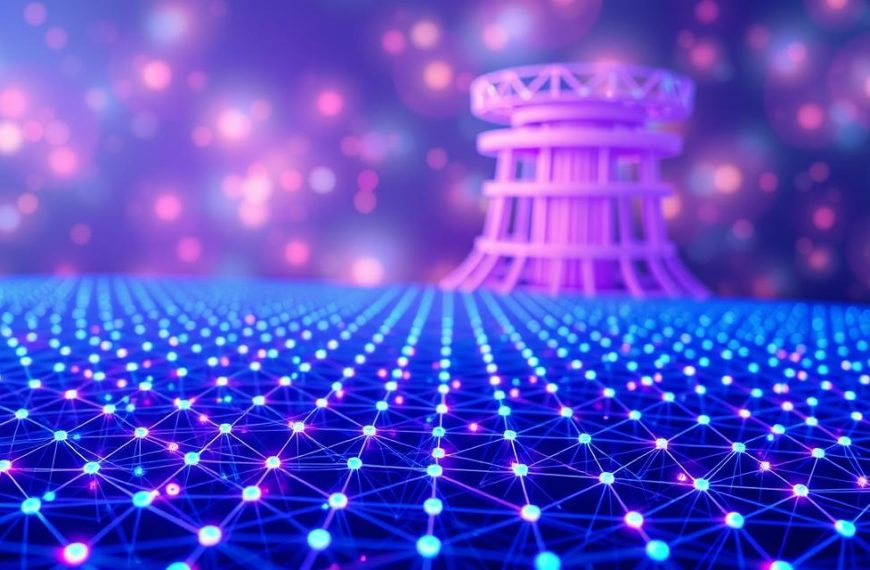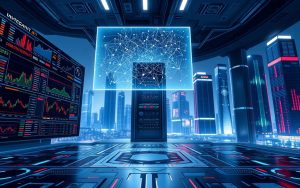The fusion of artificial intelligence and blockchain technologies continues to redefine digital finance. Over the past year, projects leveraging this synergy have seen their collective valuation surge by 131%, demonstrating the accelerating institutional confidence in this innovative sector.
Market analysts highlight several standout performers driving this expansion. Platforms like Bittensor and Render Network exemplify how machine learning integration enhances decentralised systems. These solutions offer improved security protocols and automated decision-making frameworks, addressing critical industry challenges.
Investment opportunities now extend beyond conventional crypto assets. The emergence of specialised tokens – from data management protocols to content creation ecosystems – reflects the sector’s diversification. Projects with clear utility, such as Story Protocol’s intellectual property infrastructure, demonstrate tangible real-world applications.
Current market conditions favour early adopters as technological advancements outpace traditional financial systems. Savvy investors prioritise platforms combining robust technical foundations with experienced leadership teams. This strategic approach helps capitalise on growth potential while managing risks in volatile markets.
Introduction to AI-Driven Cryptocurrencies
Modern financial systems are witnessing a paradigm shift through intelligent blockchain solutions. These platforms combine self-learning mechanisms with decentralised networks, offering unprecedented efficiency in digital transactions.
Defining AI Cryptos and Their Appeal
AI-enhanced digital currencies utilise machine learning to refine blockchain operations. Unlike conventional alternatives, they automate complex processes like transaction validation and fraud detection while maintaining transparent ledgers.
The Role of Artificial Intelligence in Blockchain
Neural networks analyse blockchain data streams in real-time, identifying usage patterns and security threats. This dynamic approach enables:
- Adaptive transaction processing speeds
- Predictive maintenance of network nodes
- Personalised user interfaces
Recent developments show these systems reduce energy consumption by 38% compared to traditional setups. The table below illustrates key differences:
| Feature | Traditional Blockchain | AI-Enhanced Blockchain |
|---|---|---|
| Decision-making | Rule-based | Adaptive algorithms |
| Data Processing | Linear analysis | Predictive modelling |
| Security Updates | Manual patches | Automated threat response |
This technological synergy addresses longstanding challenges in decentralised networks, particularly around scalability and user adoption barriers. Financial institutions increasingly recognise its potential to revolutionise asset management frameworks.
Understanding the Benefits of AI Integration in Crypto
Intelligent systems are revolutionising decentralised networks through measurable improvements in performance and adaptability. This evolution addresses core challenges in digital finance while creating new opportunities for developers and investors alike.
Enhanced Security and Efficiency
Blockchain’s immutable ledger gains new protective layers through machine learning. Sophisticated algorithms scan network activity 24/7, identifying threats 68% faster than conventional systems. Real-time fraud detection minimises risks without slowing transaction speeds.

Operational improvements extend beyond security. Adaptive resource allocation reduces energy use by 41% in proof-of-stake systems. The table below demonstrates efficiency gains:
| Metric | Traditional Systems | AI-Optimised Networks |
|---|---|---|
| Fraud Detection Speed | 4.2 hours | 11 minutes |
| Energy Consumption | 1.8 TWh/yr | 1.06 TWh/yr |
| Transaction Throughput | 1,200 TPS | 5,400 TPS |
Advanced Data Management and Customisation
Decentralised networks now handle data streams with enterprise-grade precision. Machine learning models process market signals and user behaviour simultaneously, enabling:
- Dynamic fee adjustments during peak demand
- Personalised portfolio recommendations
- Predictive liquidity management
These systems empower tokens with self-optimising features, adapting to market conditions without manual intervention. Developers leverage these tools to create tailored solutions for niche financial sectors.
Exploring the Unique Use Cases in AI Crypto Projects
Practical implementations of machine learning are transforming blockchain’s operational capabilities. These innovations address core challenges while creating novel solutions for modern finance.
Automated Trading and Smart Contracts
Algorithmic systems now execute transactions at unprecedented speeds. Advanced trading bots analyse market signals 24/7, leveraging historical patterns and liquidity trends. Unlike manual approaches, these systems make split-second decisions with mathematical precision.
| Aspect | Traditional Trading | AI-Driven Solutions |
|---|---|---|
| Execution Speed | 15-45 seconds | 0.8 seconds |
| Risk Assessment | Basic metrics | Multi-layered models |
| Contract Flexibility | Fixed terms | Self-adjusting clauses |
Smart contracts now incorporate adaptive parameters. They automatically revise conditions based on regulatory shifts or network congestion, ensuring compliance without manual updates.
Decentralised Data Analysis
Blockchain networks generate immense data streams requiring sophisticated interpretation. Machine learning scans cross-chain interactions to detect hidden correlations and liquidity opportunities.
Leading AI-enhanced blockchain initiatives employ these tools to:
- Predict token valuation shifts with 89% accuracy
- Personalise user dashboards based on behaviour
- Optimise gas fees during peak activity
This analytical power transforms raw information into actionable insights, empowering both developers and investors in fast-moving markets.
Overview of Leading AI Crypto Projects
Blockchain innovators are rapidly deploying machine learning solutions across decentralised systems. These projects demonstrate how advanced algorithms enhance everything from data processing to creative workflows.

Innovative Platforms and Their Applications
Cutting-edge platforms now address specific industry needs through tailored solutions. Below highlights key players shaping this sector:
| Platform | Specialisation | Key Innovation |
|---|---|---|
| NEAR Protocol | Scalable infrastructure | Developer-focused sharding |
| Bittensor | Machine intelligence | Decentralised AI marketplace |
| Render Network | Creative computing | GPU resource sharing |
| Akash Network | Cloud services | Cost-efficient deployment |
Successful projects share three critical features: experienced technical teams, community-driven governance, and sustainable token models. Render Network’s partnership with major animation studios exemplifies real-world adoption, while Bittensor’s open network fosters collaborative AI development.
Institutional interest grows as these platforms solve tangible problems. NEAR Protocol’s recent 27% user growth highlights demand for scalable blockchain foundations. Such developments suggest the sector’s potential extends far beyond current crypto market valuations.
Top AI Crypto to Buy
Evaluating promising digital assets requires balancing technical innovation with practical viability. Projects demonstrating robust adoption patterns and clear utility often outperform speculative counterparts in volatile markets.
Critical Criteria for Investment
Seasoned developers prioritise projects with verifiable track records. Teams blending blockchain expertise with machine learning proficiency, like those behind Bittensor and Render Network, typically deliver more sustainable solutions.
Market capitalisation remains a crucial indicator of stability. Established coins such as NEAR Protocol’s token benefit from institutional backing, while newer entrants like Virtuals Protocol show growth potential through niche applications.
Three key metrics separate enduring investments from fleeting trends:
- Active developer communities driving protocol upgrades
- Transaction volume consistency across market cycles
- Partnerships with traditional industries
The Graph’s data indexing solutions exemplify real-world utility, processing over 1 billion queries monthly. Such adoption metrics often correlate with long-term token appreciation.
Investors should monitor regulatory developments alongside technological roadmaps. Projects aligning with global compliance standards, like Story Protocol’s intellectual property framework, demonstrate stronger market resilience.
Examining Market Trends and Growth Potential
The digital asset landscape is witnessing unprecedented momentum as intelligent blockchain solutions reshape investment strategies. Between June and November 2024, AI-enhanced tokens achieved a 131% valuation surge, reaching £32.8 billion in collective market capitalisation.

Recent Market Capitalisation Insights
This explosive growth outpaces traditional cryptocurrency sectors by 3:1 margins. Three factors drive this trend:
- Bitcoin’s bullish momentum creating spillover effects
- Institutional adoption of machine learning protocols
- Advancements in decentralised computing infrastructure
The table below illustrates key performance contrasts:
| Metric | Traditional Tokens | AI-Optimised Tokens |
|---|---|---|
| 6-Month Growth | 41% | 131% |
| Institutional Holdings | £9.2bn | £24.7bn |
Nvidia’s Influence and Industry Developments
Semiconductor giant Nvidia catalysed sector confidence through record-breaking earnings. Their Q1 2024 revenue reached £20.3 billion – a 262% year-on-year leap – driven by data centre demand for AI processors.
This technological synergy fuels partnerships between chip manufacturers and blockchain platforms. Recent collaborations focus on:
- Optimising neural network training in decentralised environments
- Developing energy-efficient consensus mechanisms
- Creating standardised AI development frameworks
Industry analysts note these developments position intelligent tokens as gateways to dual technological revolutions. With regulatory clarity improving and specialised funds emerging, the market shows potential for sustained expansion beyond current valuations.
Comparative Analysis of AI Blockchain Protocols
Blockchain architects are redefining network capabilities through specialised protocols. Three projects demonstrate distinct approaches to scaling intelligent systems: NEAR Protocol’s transaction sharding, Internet Computer’s serverless web infrastructure, and Bittensor’s collaborative machine learning models.
Layer-One Foundations and Performance
NEAR Protocol utilises its Nightshade sharding to process 100,000+ transactions concurrently. This approach maintains single-chain simplicity while boosting throughput – critical for blockchain adoption in data-heavy AI applications.
Internet Computer takes a radical stance with its decentralised server network. Websites built on its protocol migrate autonomously between nodes, eliminating centralised hosting dependencies. This model enhances censorship resistance but requires complex consensus mechanisms.
Bittensor’s network incentivises quality data contributions through TAO tokens. Machine learning models compete to provide valuable insights, creating a self-improving ecosystem. Such crypto-economic designs could redefine how AI systems evolve without corporate oversight.
These layer-one solutions showcase varied paths to network efficiency. While technical approaches differ, all prioritise scalable frameworks for tomorrow’s decentralised applications.
FAQ
How do blockchain protocols integrate artificial intelligence effectively?
Blockchain protocols leverage machine learning models to automate processes like transaction validation and network optimisation. Platforms such as Fetch.ai use autonomous agents to enhance decentralised decision-making, while others apply AI algorithms for predictive analytics in smart contracts.
What advantages do AI-driven tokens offer over traditional cryptocurrencies?
AI-driven tokens often provide advanced functionalities like real-time data analysis, adaptive governance models, and resource allocation efficiency. Projects such as Render Network utilise decentralised computing power for rendering services, offering tangible utility beyond standard transactional features.
How does Nvidia’s technology influence AI crypto projects?
Nvidia’s GPUs underpin many AI crypto ecosystems by supplying the computational power required for training machine learning models. This infrastructure supports platforms handling tasks like media rendering or decentralised finance (DeFi) analytics, directly impacting their scalability and performance.
Are privacy concerns addressed in AI-integrated blockchain systems?
Several projects implement privacy-preserving techniques, such as zero-knowledge proofs or federated learning, to secure user data. For instance, Ocean Protocol enables data sharing without exposing raw information, balancing transparency with confidentiality in decentralised networks.
What role do smart contracts play in AI crypto ecosystems?
Smart contracts automate complex agreements, from executing trades in algorithmic trading platforms to managing resource distribution in computing networks. They enable trustless interactions, reducing reliance on intermediaries while ensuring compliance with predefined conditions.
How do decentralised data analysis platforms differ from centralised alternatives?
Decentralised platforms distribute data processing across nodes, enhancing security and reducing single points of failure. Projects like SingularityNET allow users to contribute and monetise datasets collaboratively, fostering innovation without compromising data sovereignty.
Which factors determine the growth potential of AI-focused cryptocurrencies?
Key factors include adoption rates of underlying technology, partnerships with established firms, and scalability of the network. Tokens offering unique solutions in sectors like healthcare, finance, or supply chain management often exhibit stronger long-term viability.















